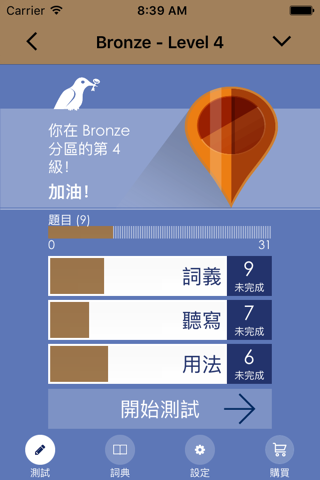
學習牛津 3000 詞 Learn the Oxford 3000
Learn the Oxford 3000 - the most important and useful words you need to know to succeed in English
By learning the Oxford 3000 you will be able to understand up to 85% of the words in a typical text in English.
With this app, you can study the words on the Oxford 3000, and test yourself on them.
***IMPORTANT: This free download will give you sample dictionary entries and test questions. An in-app purchase is required to activate the full content.
Test Yourself
• The words of the Oxford 3000 are divided into three zones, Gold, Silver and Bronze. There are 1000 words in each zone.
• The Gold zone contains the least frequent words, and Bronze contains the most frequent.
• Start in any zone you like, and unlock test levels within each zone.
• Practise meaning, usage, listening and spelling as you progress through the 3000 words.
• Answer questions to test your knowledge of the Oxford 3000 words and meanings.
• Track your progress as you go and check how many words you have learned.
Mini-Dictionary
Understand what the words of the Oxford 3000 mean, how they are used, and how to spell and pronounce them.
• Fully searchable dictionary containing all the words of the Oxford 3000 and their most important meanings
• Clear, simple definitions with example sentences (taken from the Oxford Advanced Learner’s English-Chinese Dictionary 8th edition)
• British and American pronunciation of all the Oxford 3000 words
The Oxford 3000 is a list of the most important words to learn in English, carefully selected by a group of language experts and experienced teachers. Words on the Oxford 3000 are used frequently, are used across a wide range of different contexts, and are useful for studying and using English.
Recommended if you are a learner of English with an intermediate level or above.
For more information about how the words in the Oxford 3000 were chosen, watch this video from Oxford University Press ELT: http://www.youtube.com/watch?v=F_qtVVAcdfk



